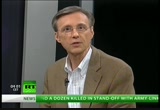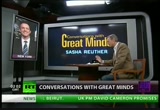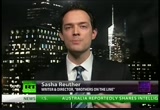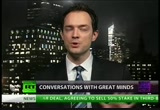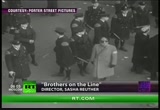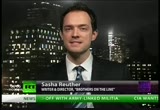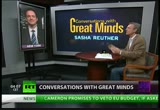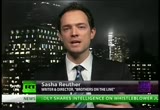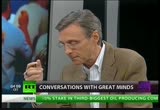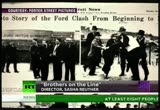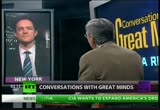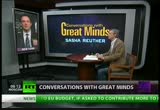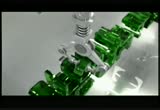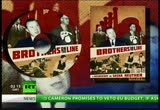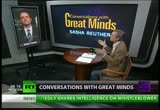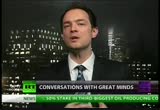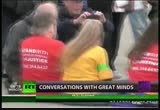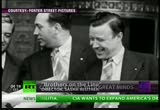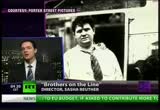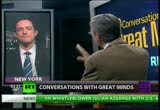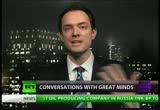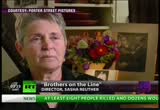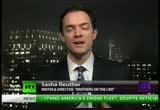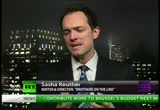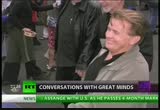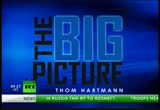tv [untitled] October 19, 2012 10:00pm-10:30pm EDT
10:00 pm
on our way to washington d.c. and here's what's coming up tonight on the big picture. with the rise of the american automobile industry came the rise of organized labor but the fight for workers' rights did not come easy in the motor city three men to help lead the charge to bring unions to detroit and revolutionize the american workplace at the same time less sosh of who these men were in tonight's conversations with three lines also mitt romney says he has what it takes to rebuild the american economy but he's listening to the very people who crashed it in the first place that and
10:01 pm
more and tonight's big picture rumble and you know those eboni machines you'll likely be using in november to cast your vote let's just say they've already made their choice for president i'll explain and i still eat it. provides conversations with great minds i'm joined by sacher ruther such as a new york based producer and director has worked in a variety of mediums including music videos commercials event coverage and short films work for multiple television networks and companies including national geographic and the sundance channel sasha's last latest project is the critically acclaimed documentary film brothers on the line which explores the story of three brothers who helped empower workers and labor unions in the early twentieth century in the united states so she joins me now from our new york studios so great to have you with us thanks for joining us thank you for having me. your. your father or
10:02 pm
your your father was walter. my great uncle was walter my grandfather was victor your grandfather was victor ok great walter played. an outsized role in my life in childhood i grew up in lansing michigan and fifty's and sixty's and you know it was a u.a.w. town and it was just. everybody knew walter. it was incredible of him and of these battles and let me let me just first of all what does german socialism have to do with the story of these three brothers. well we dip into that for a very minimal time at the beginning of the film they are you know the family the brothers are of german roots and they we begin the story of the film with these three brothers growing up in wheeling west virginia their father was an immigrant from germany and he he instilled in them this german socialism in the sense of
10:03 pm
taking care of your neighbor and understanding that the workers blue collar workers must have some given rights in the workplace they should be taken care of they're not slaves to the companies so you know here were these boys that were you know between the ages of seven and twelve years old getting these lectures literally lectures around the dinner table about how important it is to protect your neighbor and their father was a unionist trade unionist believe this part in the a.f.l. at the time and a beer wagon driver and so he instilled in them a very early age you know the idea of protecting your neighbor and fighting for your fellow worker and by socialist we're talking more about what today we would refer to as democratic socialism as you see in the in the scandinavian countries in our european countries as opposed to what you know soviet style social. socialism
10:04 pm
that sort of thing i mean there's really a world of difference between the two and and although they did once make this into the soviet union which was two of the brothers did which was quite problematic and controversial. that was not what they were about if i have this right that's correct and that's absolutely correct yes and they spent you know as you just mentioned a good part of their early career making it very clear which socialism they believed in you know democratic socialism in and pushing back against there were sort of communists that you know were taking the union the early days of the union in a certain direction that maybe were doing more for politics and not so much for the growth of the union itself and so walter and his brothers you know took great efforts to clarify which side they were on let me play a couple of clips of the movies here as we as we continue this conversation if i may this is the first one. the lead up to the workers battle with general motors.
10:05 pm
through devised tactics for the strike strategy committee. kept up more around behind the wheel of a sound truck. more term rallied his membership and those of other union locals for support but with production held hostage the industrial giant would not see it i just. turned off the water. it turned off the. police and gathered. quite an arsenal. they began. marching down the. drive and. so first of all. did you know this history growing up did you know what these men went through i'm curious you know well as a boy i did unfortunately didn't know walter reuther both passed away before i was born so i grew up around my grandfather and his stories and he was an amazing order
10:06 pm
and yes i didn't necessarily appreciate the stories when i was young but you know my my grandfather had an assassination attempt on his life and lost an eye in the late one nine hundred forty s. so i grew up with this very mysterious interesting character who is telling these stories with a glass eye he would talk of these you know violent picket line confrontations and the assassination attempt he was the international director of the union once walter became president so my grandfather spent time in india and japan and germany and so you know he i did grew up around these stories i didn't really make the connection that they were so instrumental in the fabric of the middle class and america in general but i was fascinated you know at it early age by just the storytelling the thing the impressed me is is how few people know these stories.
10:07 pm
i just most of my life just assumed everybody knew this having gone to elementary school in lansing michigan and in the in the late fifty's we actually took a labor class there was actually a class the history of organized labor in like porth great i mean we we knew the story we they had news reels and things that i'm assuming the u.a.w. probably provided to the schools at no charge but i remember watching you know the great flint sit down strike and so we knew what we knew the timeline of things and it seems that with the reagan revolution and bill bennett taking over their part of education and just this whole change in america's attitude toward organized labor at least much of america's attitude toward organise labor that history has vanished . my sense of it and you're much younger than me tell me if this is the case is that people who are you know forty five or under probably have no idea because they never studied it in school we just don't teach that in america anymore you know
10:08 pm
you're one hundred percent accurate i that's and that's another reason why i really wanted to tell this story is that had i not grown up in this family my high school never taught it none of my peers know this story i mean forget about knowing the route through specifically but just labor history in general so i just felt there's this huge swath of of you know an important piece of american history that nobody knows about i mean these characters that pop up in the civil rights movement and believe the middle class and so i just i felt dedicated not just to kind of uncover this family's story but to get this key piece of education out there i mean pro or anti union it doesn't have to be about that you have to give it to i mean even conservative leaders would look at this movement understand how powerful and influential it was so why at least expose the story to you know my generation so that certainly was a big part of it and the funny thing is people of my generation in detroit while we were filming this we went out there and i was speaking of people my generation they know the walter p. route their freeway and that's all they know they don't know who he is they know there's a highway named after this person and that's all they know so even with just that
10:09 pm
little piece of it i felt like you know i got to get out there and tell this story and that's a tragedy i mean i can tell you there was a time in america one when we learned about the pullman porters strike you know we learned if we learned well haymarket square all that stuff it was it was fourth grade anyway we need to come back to that in fact the the the little video clip that we just played about the police massing you know against the first battle against g.m. after g.m. . walter walter and his brothers took on ford and ford was not at all happy about that we've got a little clip about a little piece of the movie about going up against ford let me play this. on the overpass again for nineteen thirty seven. myself and other people with a group of ministers were standing there on property not private property we went there to make it does your you. want service man came in.
10:10 pm
they do this when everything is what it's all the best it was it's less we did provoke it. just as you know if it's. the servicemen went on to smash cameras and harass the reporters one photographer managed to slip away and his photos were plastered on front pages across the country. and that's of course exactly what walter is wanted to have happened was that symbolic moment where ordinary people who weren't union members people living on the farm could look at the newspaper and say well geez that's not right. in earlier or later actually in the movie there is a place where one of the people who was around at that time makes the comment to you the filmmaker or was interviewing her that these people were willing to die for
10:11 pm
what they believed in and the arc of the movie in many ways my sense of it was also the story of how american workers went from dying in the workplace to being willing to die to have democracy in the workplace a say in the workplace how did those brothers. communicate that kind of a passion that that people would literally put their lives on the line. for for to create a middle class. well it's interesting i mean communicating is one thing and they were all all three brothers were tremendous speakers but it was in their actions i mean what the clips that we just saw i mean they were they were on the verge of martyrdom in an interesting way i mean these were men that you know their activities they not only gave great speeches and they were on the picket line and negotiating and doing these great things but by their actions always being i mean i
10:12 pm
guess like the great generals so to speak i mean if it was somewhat of a war they were out front they were not just going to send you know the lower ones in the union the lower levels of union organizers out front they were there you know in the flint sit down strikes my grandfather was in the sound truck that basically was driving around and you know he was you know building the enthusiasm of those on the picket line and you know keep up your enthusiasm and so and so and there were tear gas canisters flying at him so i think that you know they could give big speeches and say that you know this is basically our god given right and you know we're not we're not slaves to the company and there should be these these essential rights that we must have in the workplace and they gave those speeches very well but they you know they walked the walk they were always out there and they were willing to you know bare their chest for you know against the national guard or the the thugs that the company might bring at them so i think it was more
10:13 pm
the actions and any speech they could give and they lived what they believed to be so much to more conversations with great minds and saussure ruth after the birth. of. science technology in the. all the rest of. russia we. covered. was the strangest attempt to take out. the president trying to overthrow a foreign country but his strategic games must. recognize to defeat. questioning steve cuba to cope with.
10:14 pm
10:15 pm
conversations of great minds with. such as a new york based producer and director who has worked in a variety of mediums including music videos commercials event coverage and short films his latest project is the critically acclaimed documentary film brothers on the line which explores the story of three brothers who helped empower workers and labor unions in the early twentieth century of america literally changed the face of nature in this country let's go back to it sasha after the the workers at ford finally formed a union ford strike was over the community prospered tremendously if i may play a short clip from the movie that talks about this and get your your refund that here it is. in just a handful of use a small army of workers had forced the colossal car makers to recognize their right to. the relationship between labor and management we changed forever. the youth
10:16 pm
was an important pillar of stability central to the lives of its members and their communities union leaders occupied a position of power and respect and waterloo through stock was on the right. do you have any sense the that time in history the thirty's to basically the eighty's when the when the unions had a lot of power in the united states and about a third of all americans working were unionized and now it's down to eight percent the private workforce. but that may come back. well i mean i see. the i mean this it's that i mean that's this whole stories about you know strong labor unions strong movement in general i feel that we are in a time in this country where labor there's a you know the door is cracked open for labor again you know workers backs are against the wall we're coming out of you know major. depression so it's kind of
10:17 pm
cyclical i feel like there's a lot of similarities to the one nine hundred thirty s. so i think it's it's it's very possible but i think that the larger industries and you know mention something like wal-mart would have to be a little bit more respectful of their labor and i feel that you know what's happening now in this sort of little bubbling situations where there's a couple of walkouts in here and there you know are good at least to build the momentum of labor whether or not wal-mart's going to become organized but to just build the spirit of workers can't there are moments when they've had enough and you know the you union the word union has just become such a bad word at least in my generation for so long that you know maybe there is community organizations that don't call themselves a union but still are out there protecting the rights of workers and will do things like organizing walkouts or boycotts or whatever would need to be done if it doesn't need to be called a union so i think it's very possible and i do believe you know labor in general
10:18 pm
have a resurgence because i feel that this country prospers like film shows when you have a strong labor movement it absolutely does right now there is there are a number of walkouts and strikes going on with wal-mart and you know wal-mart was one time in its history has been successful unionized was a store over canada and they closed the store and so that's a we're going to walk away that's how much they hate unions and and won't have anything to do with unions so it's it's but there was a difference in the time that your grandfather and his brothers were were organizing the unions and there are these workers rather and forming these unions and as much as the detroit news for example was showing the pictures it was of the detroit news photographer got those pictures when i was a kid the detroit news was still in print and we used to get the detroit news in the detroit free press the free press was the business paper it had a business section they always editorialized for the republican. the detroit news
10:19 pm
was the labor paper it had a labor section didn't have a business section and they always editorialized in favor the democrats the days when every town in america had at least one newspaper that had a labor section and are gone days when when you know local television and radio even existed are gone and now we've got these large transnational corporations that basically run our media that in many cases themselves are not unionized or if they are or if they are they're only grudgingly and they certainly don't want to be talking about unions on the air do you see any possibility of breaking through that or have times changed so much that there's now is systemic wall to prevent what your grandfather and his brothers did you know i you're right i mean i think that the brothers in the u.a.w. at that time had a tremendous spin machine too i mean they had their own newspaper they had their clearly from what we're showing the film they had their own sixty millimeter film coverage and things like that so i think that in this day and age i think that
10:20 pm
there is interest you have to get the public interested again in these kind of stories like learning about labor or compassion about workers' struggles and you know in a way it's kind of like coming through the back door sneaking in stories here and there maybe it's in a sitcom maybe it's in a reality show why do the union union representations and a lot of shows have to be the corrupt union members why can't we show a labor union doing a good thing which they do for communities so i'm excited about being you know a small part of that if i can in my sort of film career as i move forward here and there showing some positive work or a positive labor story so maybe it's not if we don't get coverage in a newspaper maybe it's showing it on one of these other levels a major film a reality show something like that so you know i think maybe that's a way to get more attention to labor and get a sort of a more positive spin on things and the this film is brilliant because it's a brilliant piece of history as well as a. i think
10:21 pm
a cautionary tale for our times do you said earlier that if if the labor movement of the thirty's forty's fifty's sixty's were to be reinvented today it probably would have to be called something other than a union because of all the spin the bad spin that has been put on the unions over the years what in your mind is the relationship between the occupy movement and that kind of social transformation that happened in the thirty's between. yeah i tend to bring that up a lot we've been screened the film around the country and during the q. and a sessions i mention occupy all the time i feel that first of all i feel that even though it times we read about what we read about them what we see seems somewhat disorganized and disjointed and without sort of a leadership structure but i think labor would be missing out without incorporating the enthusiasm and the bodies literally the marching bodies in the street that
10:22 pm
occupy is all about so i think that there is a relationship there and i sort of feel like that's what occupy really would need is that you know creating themselves as somewhat of an organization they're not a union but representing all those important things you know fighting for community you know spreading the wealth protecting workers' rights all these things that unions and labor have done for years and continue to do but because the word labor has just been scarred and marred all these years that occupy has a chance to maybe. you know remind them of where they came from and so maybe occupy could sort of meet in the middle labor and occupy that could mean the middle and create these more of a sort of a community responsive organization or could it be that the occupy movement is a symptom that the moment is pregnant you know the here we are it's it's now time for something and this might be the first crack the first thing coming out def it's definitely that absolutely. let me play another clip this is walter ruther being
10:23 pm
shot this is people we're not happy about what your grand uncle was doing we'll just play this clip. on the screen. and he was in line. in the kitchen in a pool of blood and mother was leaning over him. i drove here. and never driven a. limb. walter was shot right nearly ripped off. penetrated his chest and. back and he was. trying how did the incident
10:24 pm
change or alter or effect walter and his brothers and the labor movement so. well i mean there is i think they knew that they had these enemies and as we mentioned earlier they were prepared for these kind of attacks and the violence so i mean how did it change them in their personal lives obviously body guards looking around your shoulder not knowing who to trust already the labor movement was you know filled with interesting characters like i'd mentioned earlier there were people that might have been more interested in interested in politics or you know leading towards the direction of communism and they you know in detroit the mafia had infiltrated the auto industry so. you know i think that obviously they were much more careful in the way that they stepped but in the same part they were very interesting and unique individuals because i think it only invigorated them more.
10:25 pm
or inspire them or because here they had basically was coming on hundreds and thousands of members that were just cheering them on and were so surprised that they could get back up and it wasn't literally brushing themselves off obviously there was a long rehabilitation but these men both men my grandfather also had an assassination attempt survive these things so i think that certainly there was a transition in being more careful in feeling protected in secluded. maybe limiting their reach to other groups because they were just protected for so long but this was a terror attempt did it didn't succeed in terrorizing them. i don't really seem to show it here i think that i mean i can say that certainly wives and the family and i begin to learn a lot of the back story about how i do believe that their children and the wives were afraid a lot of the time and that's a whole nother film i can tell about you know being this connection to very powerful men sure where they themselves terrorized and felt concerned about their
10:26 pm
their well being i had it's hard to tell because they got right back up again seems like every job legally committed to this. show in the in the just in the minute we have left martin sheen actor and activist narrates the film he said of your family they basically created the middle class that's a pretty big compliment your thoughts. martin was amazing i mean i i think that they certainly were a part of planting a seed but there were many other activists at that time and they really came at the right time they were young and susie has the men and women that felt that you know now is our time you know workers as i mentioned the beginning can't just be slaves of the company they were individuals so i think that they understood how to be business and labor at the same time they really understood the middle ground and how to sort of create and shape what should be more than just the the bottom and the top there has to be somewhat of a middle and they did they did that absolutely brilliantly a marvelous piece of filmmaking. marvelous history and extraordinary history. thank
10:27 pm
10:29 pm
it's friday you ready to rumble joining me for tonight's big picture rubble are adam bitly editor in chief of net right daily lives chatterton democratic strategist and president of the chattering group and or as cooper conservative commentator and senior fellow at the national center for public policy research this week thanks thanks to all of you for joining really bridget this week with in these times broke a story revealing that mitt romney had actually encouraged employers were part of a.
19 Views
Uploaded by TV Archive on

 Live Music Archive
Live Music Archive Librivox Free Audio
Librivox Free Audio Metropolitan Museum
Metropolitan Museum Cleveland Museum of Art
Cleveland Museum of Art Internet Arcade
Internet Arcade Console Living Room
Console Living Room Books to Borrow
Books to Borrow Open Library
Open Library TV News
TV News Understanding 9/11
Understanding 9/11
